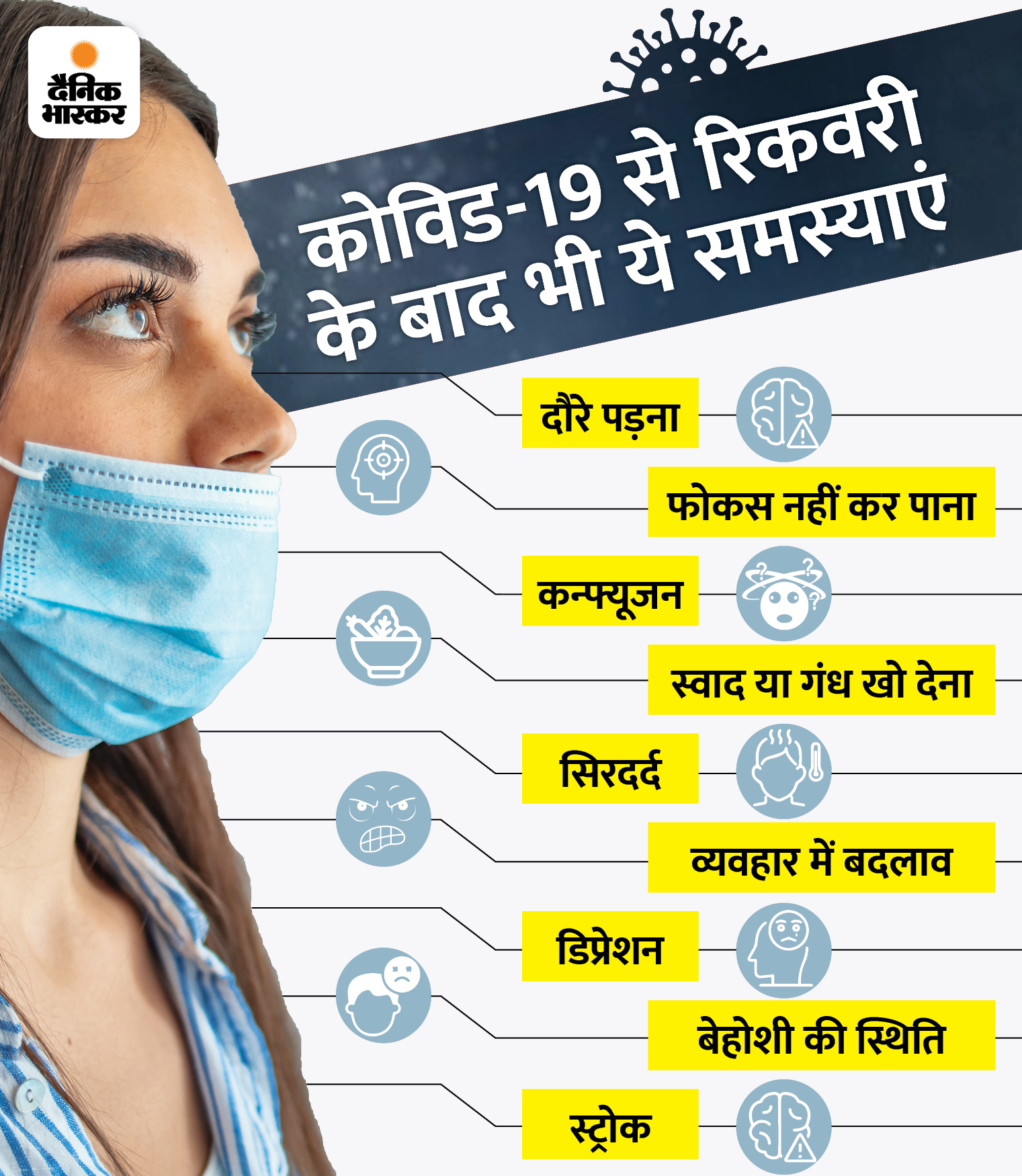3 minutes agoAuthor: Ravindra Bhajani
- copy link

Before the second wave hit India, Kovid-19 was just a respiratory infection. Now researchers have proved from different studies that Kovid-19 does not only damage the lungs. There is also trouble in other parts of the body. Brain problems are also emerging due to damage to brain cells during long covid or post-covid recovery.
Data suggests that one in 7 patients suffering from Kovid-19 are showing neurological side effects related to brain fog or memory. The virus does not directly attack brain cells or nerves, but the inflammation, blood clots and other effects caused by the Kovid-19 infection are causing problems such as stroke and seizures in severe symptoms.
Dainik Bhaskar, Dr. Azad Irani, Consultant Neurologist, Jaslok Hospital and Research Centre, Mumbai, Dr. Kaustubh Mahajan, Consultant Neurology, PD Hinduja Hospital and Medical Research Centre, Khar (Mumbai) and Dr. Rahul Gupta, Director- Neuro & Spine Spoke to Surgery, Fortis Hospital, Noida. Understand from these experts what kind of brain problems are coming in post covid.
What kind of problems have come up after recovery from Kovid-19?
- A team of researchers from King’s College London and the University of Cambridge prepared a questionnaire to understand Kovid-19 infection. Answers were taken from 81 thousand people on these questions. Studies show that people who have recovered from Kovid-19 are finding it difficult to concentrate and think. According to this study published in the journal EClinicalMedicine, those whose symptoms were severe, their ability to think and understand was affected more.
- This problem is also visible in India even after eight weeks of recovery of patients. The severity of these problems can vary from person to person. Some people are experiencing memory loss, difficulty concentrating or feeling tired. Symptoms are more visible in patients who have spent more time with low oxygen levels. These include confusion, headache, depression, trouble concentrating, seizures, stroke, behavioral changes, and nervousness.

How is the brain damaged due to COVID-19?
- Kovid-19 affects mental health in two ways – in brain cells and nerves and in a psychological way. Talking about neurology, stroke, seizures, symptoms like Parkinson’s, diabetes can be the reason for this. Long term effects also include multiple cirrhosis. Psychological issues include anxiety, depression. Blood clotting caused by COVID-19 can lead to strokes. At the same time, diabetes also occurs due to corona. Sudden increased sugar level affects the nerves.
- If you talk about the indirect connection of Kovid-19 and brain health, then due to the lockdown and isolation period, people who were facing early symptoms of early dementia and Parkinson’s disease have suffered more. His condition has worsened.
Did the virus reach the brain even cause deaths?
- Yes. Patients complaining that there is no smell due to mild and moderate Kovid-19 infection. On investigation, it was found that the virus is infecting the lungs as well as the nervous system. It is going to the brain cells. Dr. Gupta says that blood clots and hemorrhages also cause strokes. In the first and second wave of Kovid, many patients required surgery. Facial features have also been found to be flawed in some patients. In some patients, black fungus became fatal by going into the brain.
- Not only this, some patients have also gone into coma due to Kovid-19. According to Dr. Irani, neurological symptoms are visible in some patients even after a few months of recovery. Scientists have named it long-covid, which also includes symptoms of nervous system effects.

Why is covid infection affecting the way the brain works?
The study is going on on the problems faced by people even after recovery from Kovid-19. In some studies, it has been found that the amount of gray matter in the outer part of the brain can be reduced when infected. Some theories have come out about this so far-
- Serious Infections: Researchers say that in severe cases, the virus can enter the central nervous system (blood and spinal cord). Can spread infection. Studies have found that the genetic material of the virus has also been found in the spine fluid.
- Overactive Immune System: Overactive immune system due to Kovid-19 can also be a reason. In the course of fighting the virus, inflammation can occur in the body which can damage other organs and parts of the body.
- Changes in the body Changes in the body caused by Kovid-19, such as high fever, low oxygen levels, or organ failure, increase the risk of brain diseases. Over time this can lead to delirium or even coma.
How can these problems be overcome?
Along with physical health, it is very important to take care of brain health during the overall recovery from Kovid-19. By taking a few steps, you can rebuild your neurological health and the damage can be minimized.
- brain activity: To strengthen the muscles of our body, we do strength training and cardio. Similarly, to strengthen the brain muscles, you need to participate in some brain activities. Studies claim that challenging activity reactivates your brain cells and helps increase focus.
- Healthy Foods: A good diet is very important to be completely healthy. Green leafy vegetables, fatty fish can improve the health of the nerves that supply blood to your brain. It protects against cardiovascular disorders. Add brain-healthy foods to your diet.
- Meditation: One of the best ways to overcome mental problems is through meditation or meditation. It helps you to reduce stress and psychologically relax the body. It can help you lower blood pressure, increase immunity, and lower blood sugar levels.
- enough sleep Your sleep and mental health are directly related. Because of this, try to get enough and deep sleep at night. Try to follow the routine even on weekends. Quality sleep at night has a direct impact on your everyday thinking power, memory and mood.

